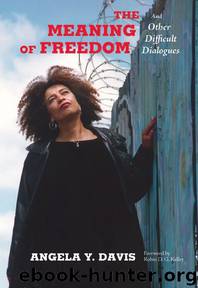The Meaning of Freedom: And Other Difficult Dialogues (City Lights Open Media) by Angela Y. Davis

Author:Angela Y. Davis [Davis, Angela Y.]
Language: eng
Format: mobi
ISBN: 9780872865860
Publisher: City Lights Publishers
Published: 2012-08-14T00:00:00+00:00
SIX
Abolition Democracy
December 2, 2005
Oakland, California
Serendipitously, this meeting takes place on December 2, International Day for the Abolition of Slavery as designated by the United Nations. Throughout the world people are observing this day by reflecting on the continued presence of slavery on our planet—especially in the form of the trafficking of human beings—and by rededicating themselves to the project of abolishing slavery. In a message released today, UN Secretary General Kofi Annan said: “People who perpetrate, condone, or facilitate slavery or slavery-like practices must be held accountable by national and, if necessary, international means.” “The international community,” he said, “must also do more to combat poverty, social exclusion, illiteracy, ignorance, and discrimination, which increase vulnerability and are part of the underlying context for this scourge.”
As this benefit for the Pacific radio station KPFA is a book launch for Abolition Democracy: Beyond Empire, Prisons and Torture (and I will be reading passages from the book), I want to consider how to articulate a triple abolition: abolition of the death penalty; abolition of the prison-industrial complex, including its military components with their technologies of torture and terror; and abolition of the sediments of slavery that have been sustained by capital punishment and the prison system. Issues raised by abolition, especially when we consider the abolition of slavery as organically linked to the abolition of prisons and capital punishment, help us to recognize the pitfalls of abstract equality and formal democracy. One of the glaring contradictions enabled by the cohabitation of poverty and racism, on the one hand, and legal equality and democracy, on the other, can be found in the soaring population behind bars and the cavalier manner in which increasing numbers of people are being put to death.
This morning at 2:00 a.m. Eastern Time, when Kenneth Lee Boyd was executed by the state of North Carolina, he became the one-thousandth person to be put to death since the reinstatement of the death penalty in 1976. Just a few hours ago, Shawn Humphries was executed in South Carolina. Wesley Baker is scheduled to be executed in the next few days in Maryland. And then there is the death chamber at San Quentin Prison, which is scheduled to be used on December 13 to extinguish the life of Stanley Tookie Williams. For the last twenty-five years of his life, Stanley has been in prison refashioning himself and reaching out to others. An autodidact, he has published nine books, including eight that are specifically addressed to children and designed to direct them toward productive futures rather than gang life. He has also given lectures by telephone to schoolchildren and youth of all ages. As a result of his Protocol for Street Peace, which has been used by rival gangs around the country and the world, he has been nominated for the Nobel Peace Prize. Moreover, he also received the President’s Call to Service Award. Let us redouble our efforts here in the Bay Area to prevent our state from killing him.
Over the last decade, capital punishment has become more and more rationalized and routinized.
Download
This site does not store any files on its server. We only index and link to content provided by other sites. Please contact the content providers to delete copyright contents if any and email us, we'll remove relevant links or contents immediately.
| African-American Studies | Asian American Studies |
| Disabled | Ethnic Studies |
| Hispanic American Studies | LGBT |
| Minority Studies | Native American Studies |
Cecilia; Or, Memoirs of an Heiress — Volume 1 by Fanny Burney(32548)
Cecilia; Or, Memoirs of an Heiress — Volume 2 by Fanny Burney(31947)
Cecilia; Or, Memoirs of an Heiress — Volume 3 by Fanny Burney(31932)
The Great Music City by Andrea Baker(31917)
We're Going to Need More Wine by Gabrielle Union(19034)
All the Missing Girls by Megan Miranda(15958)
Pimp by Iceberg Slim(14488)
Bombshells: Glamour Girls of a Lifetime by Sullivan Steve(14057)
For the Love of Europe by Rick Steves(13915)
Norse Mythology by Gaiman Neil(13349)
Talking to Strangers by Malcolm Gladwell(13349)
Fifty Shades Freed by E L James(13233)
Mindhunter: Inside the FBI's Elite Serial Crime Unit by John E. Douglas & Mark Olshaker(9324)
Crazy Rich Asians by Kevin Kwan(9279)
The Lost Art of Listening by Michael P. Nichols(7494)
Enlightenment Now: The Case for Reason, Science, Humanism, and Progress by Steven Pinker(7306)
The Four Agreements by Don Miguel Ruiz(6745)
Bad Blood by John Carreyrou(6611)
Weapons of Math Destruction by Cathy O'Neil(6265)
